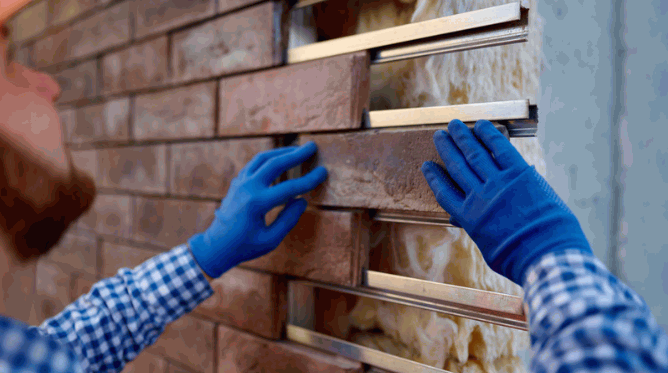
Cladding is an important element of many commercial buildings. Not only does it help to improve the appearance of the exterior but it also provides thermal insulation and protection from the elements. Keeping cladding clean, therefore, doesn't just keep your building looking its best but it also helps to maintain the cladding so that it can protect your building as it should.
If you would prefer to use a professional cleaning company, our cladding cleaning services use innovative technology to clean your cladding to a high standard without compromising its integrity. We offer a regular cladding cleaning schedule as well as one-off cladding cleaning.
If you fancy taking on the job yourself, read on for our guide to cladding cleaning.
The great British weather is the source of many conversations but it can also wreak havoc on exterior cladding. While cleaning can't protect from all weather damage, it can certainly help to maintain the protective coating that your cladding will have on its surface. And this coating is an important factor in preventing damage deeper into the cladding itself.
Wet conditions are ideal for the growth of plants such as moss, lichen, and algae. Cleaning cladding will remove these before they can damage the coating on your cladding. And before they take over and spoil the look of your building.
Pollution from vehicles can cause cladding to corrode. Regular cleaning can help to prevent this by maintaining the protective coating on your cladding.
Many cladding companies will have a stipulation in their warranty that to claim, the cladding will need to have been maintained. Regular cleaning is a part of this maintenance and should be done to stay within the warranty.
A regular cleaning schedule for your cladding can save you money. It will help your cladding to have a longer life and it will mean that you may not need to pay for expensive repairs and replacements as often.
Of course, cladding cleaning for the purposes of protecting your cladding is of the utmost importance. But it can also help the exterior of your building to look better too. Dirty cladding with moss, grime, and bird droppings is never going to make the right impression. Making sure your cladding is cleaned regularly will help to maintain its appearance.
There is a wide variety of cladding materials available. All of them will need regular cleaning to maintain their appearance and prevent damage. The cleaning process can also vary depending on the material so it is important to make sure that you use the right method for your cladding type.
The most common types of cladding in the UK include:
For all types of cladding, you will need some equipment to get the cleaning work done. Jet washing is a popular method so if you have a pressure washer to hand, this could work well. Otherwise, you will need:
Before you begin, it is a good idea to use a long brush, such as a cladding brush, to clean the exterior of surface dirt and debris. These can include leaves, cobwebs, and other small objects.
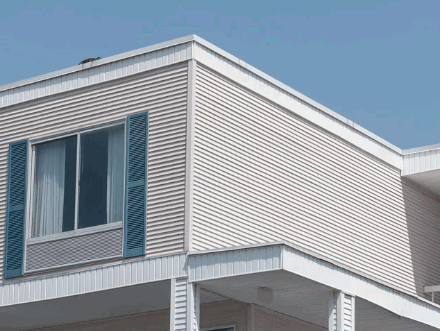
One of the most important factors to remember with metal cladding, such as aluminium or zinc cladding, is that you should almost always use water only for cleaning. Soapy water and chemicals are likely to cause discolouration of the metal and can strip off the coating.
So you should just use warm water to clean the cladding. If you are using a cladding brush, these will often allow you to feed water through them so you can sponge the surface using this.
If you are using a pressure washer, it is a good idea to start at low psi and work your way up to ensure that you don't cause any damage. For more information, check out our post “How To Pressure Wash A Driveway".
Many professional cleaning companies will have access to a gentler wash system, such as DOFF cleaning that will be less likely to damage your metal cladding. If you are concerned about the potential damage that a normal jet wash could cause, it can be a good idea to bring in some help.
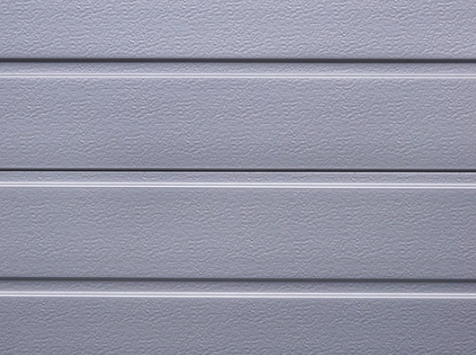
The cleaning methods for uPVC cladding are similar to metal cladding in that you need to be careful with the cleaning products that you use. Diluted dish soap can work well but you can also buy specific uPVC cleaning products that are non-abrasive and won't damage the surface of your cladding.
For uPVC cladding cleaning, you should create your cleaning solution (whether it is diluted dish soap or a uPVC cleaning product). Then apply it to your exterior cladding using a sponge and clean the surface thoroughly.
Make sure to rinse the cladding afterward to remove any remaining dirt or soap scum. At this point, you can use a microfibre or soft cloth to buff the surface and bring out its shine.
As with metal, pressure washing uPVC cladding is an option but you do need to be careful not to damage the surface of the cladding.
A professional cleaning company can help by using gentler jet-washing methods that are designed not to damage uPVC.
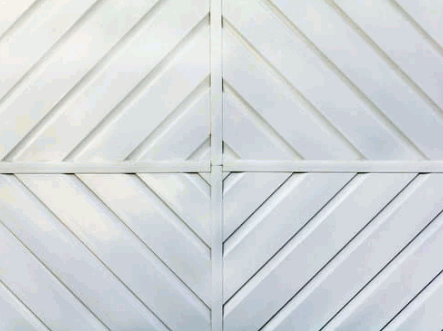
Timber can be surprisingly resilient, although it is likely to need more frequent cladding cleaning than some other materials because it is prone to mould and algae due to its ability to retain moisture.
Warm soapy water will do the trick for timber cladding. Again, you can apply this using a cladding sponge, making sure to keep fresh water coming so that you aren't reapplying dirt.
Then rinse off with clean water to get rid of the remaining dirt and soap. You could apply a protective sealant at this point to protect the cladding surface.
Jet washing can often work well for timber cladding, but not always. If you have applied a treatment to the cladding, a pressure washer is likely to strip this away. If you don't have a treatment on the timber, you should still test the pressure washer in a small corner area first to make sure that it doesn't damage the timber.
Again, rather than risk damaging the timber, it can be a good idea to bring in a cleaning company.
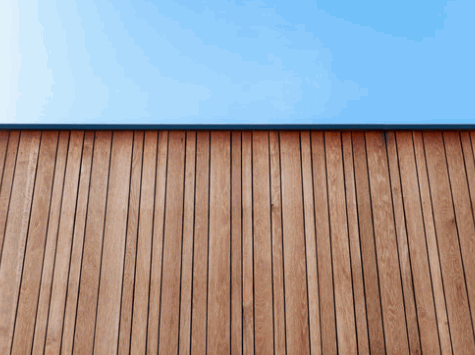
Concrete is a pretty hardy material. This type of cladding won't have a protective treatment applied and can usually be cleaned with a pressure washer.
You can also clean it using a sponge and soapy water using a cladding brush with a sponge.
If there are cement or lime stains on the concrete, you should apply a solution of 9.5% acetic acid. If there is moss, fungi, mildew, or algae growth, this can be treated using a 5% solution of hydrogen peroxide.
If you are concerned about damaging the concrete, however, a professional cleaning company will have access to methods that will ensure it will be protected.
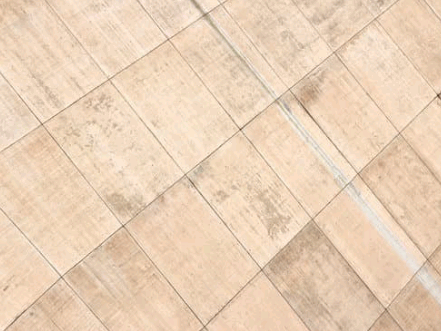
Stone cladding cleaning is very similar to cleaning concrete cladding. It often won't have a protective coating so can be cleaned with a pressure washer (as well as using a sponge and soapy water). Our post "Can You Pressure Wash Indian Sandstone" maybe interest you. You can check it out.
You do need to be careful not to damage the cement that holds the stones together as this could loosen them.
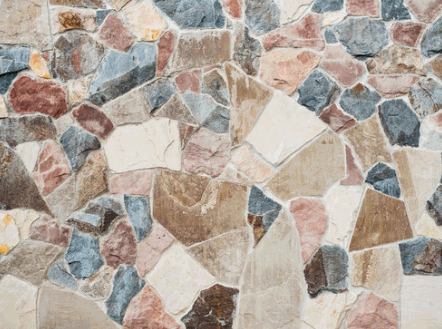
There are a range of benefits to using a professional cleaning company for cleaning cladding. This is especially the case if you have large commercial buildings.
To clean cladding, it is often necessary to get up high. This can be a dangerous prospect for someone without the necessary training and equipment. We take the health and safety of our team very seriously and they will follow all safety guidelines when conducting high-cleaning work. This can include the use of scaffolding.
As a professional cleaning company, we have the experience, training, and equipment to clean cladding to the highest standards without causing any damage to the surface. This will often include a soft wash system such as DOFF cleaning. We understand the complexities of different cladding materials and will use the correct cleaning method and wash system to ensure that the cladding is protected and also thoroughly cleaned.
Cleaning cladding can be a time-consuming task, especially if you want to make sure that it is done regularly. We can provide a tailored cleaning schedule that will offer you minimal disruption, set around your working hours, and that will ensure the health and safety of everyone on-site during the cleaning process.
It can often be more cost-effective to pay cleaning companies to clean your cladding rather than attempting to do it yourself. We will ensure that your cladding is cleaned to a high standard which will protect it from becoming damaged sooner than it would otherwise be. Having professional work on your building can also mean that potential problems will be spotted so that they can be fixed before they become a much more expensive job.
If you need cladding cleaning services, don't hesitate to get in touch. Whether you need a one-off clean or a regular cladding cleaning, our helpful team can help to create a plan and schedule that will work for you. We pride ourselves on always maintaining the highest standards and ensuring that our customers are on board every step of the way.